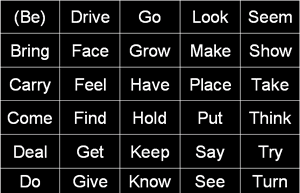Developing a verb-based style is particularly important because verbs largely control the power and clarity of written communications. Like the engine of a car, verbs are the power plants of your sentences. Verbs move sentences. Like a car with a worn-out engine, a sentence with a worn-out verb does not function properly. It stalls. And if you stall too often, readers become irritated and start honking their horns. Excessive or inappropriate use of the verb to be and talkie verbs, which we explain below, are often encountered in writing. Happily, they are relatively easy to revise for, as long as you can extract more descriptive alternatives from your memory.
Despite the benefits of using descriptive verbs, most writers' tendency to overuse to be may be explained by our heavy reliance on it when we speak. In fact, when we speak, we rely heavily on a whole family of talkie verbs (do, make, give, go, etc.). Because we use them so frequently, they are the verbs most likely to come to mind while we are writing. Unfortunately, they are so imprecise that they can be interpreted in too many ways. Thirty of these worn-out talkie verbs are listed in the following table. Revise to limit them in your writing.

Many of these verbs have accumulated a vast array of meanings over the centuries. Listing the various meanings of the verb make, for example, requires a full 13 pages in the Oxford English Dictionary; listing the meanings of the verb go requires a similar number of pages. This potential ambiguity is not particularly evident in speech because listeners can ask clarifying questions, and speakers can monitor the audience to guard against misunderstandings. In writing, you can provide no such clarification and must keep your use of talkie verbs to a minimum.
- Learn to recognize the verbs you most commonly use in speech and edit for them.
- Look for the "real" verb hidden in a nominalization following the talkie verb.
- Use a good thesaurus to suggest alternatives.
- If you use a dictation program, you must learn to edit for this pattern!